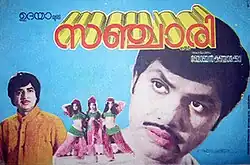Sanchari
| Sanchari | |
|---|---|
 Theatrical release poster | |
| Directed by | Boban Kunchacko |
| Written by | P. K. Sarangapani |
| Produced by | Boban Kunchacko |
| Starring | Prem Nazir Jayan K. P. Ummer Mohanlal Adoor Bhasi |
| Cinematography | U. Rajagopal |
| Edited by | T. R. Sekhar |
| Music by | K. J. Yesudas (songs) Guna Singh (score) |
Production company | |
| Distributed by | Excel Productions |
Release date |
|
| Country | India |
| Language | Malayalam |
Sanchari (transl. Traveller) is a 1981 Indian Malayalam-language drama film produced and directed by Boban Kunchacko and written by P. K. Sarangapani. It stars Prem Nazir, Jayan, K. P. Ummer, Mohanlal, and Adoor Bhasi. The film features songs composed by K. J. Yesudas and background score by Guna Singh.[1][2][3]
The film is best known for the song "Rasoole Nin Kanivaale".[4]
Plot
Sunderasan Nair and Soudamini, both are from wealthy families. Soudamini is concerned about her brothers Keshavan and Vasu who live together with Kotha, while Kotha is jealous of Soudamini. Soudamini invites her brothers to stay with them, but Kotha's sons Bargavan and Sekhar are teased by Soudamini's sons for their lack of manners and sense.
Kotha becomes more jealous, and one day Soudamini slips on a banana peel that was thrown by Kotha's son. The injury results in Soudamini developing amnesia, ceasing to recognise anyone she knows. One day Vasu murders Sunderasan, resulting in the house finally belonging to Keshavan and Kotha. Sekar grows up and becomes a doctor, but Bargavan and Shubha are brought up as servants.
Cast
- Prem Nazir as Dhwaja, Sumesh and Suresh (triple role)
- Jayan as Bhargavan
- K. P. Ummer as Mammad
- Mohanlal as Sekhar
- Sankaradi as Sankaran
- Shubha as Shubha
- Unnimary as Sumuki
- Santhakumari as Saudamini
- Roja Ramani as Sumam
- N. Govindankutty as Vaasu
- G. K. Pillai as Keshavan
- Shyama as Young Sumam
- Sukumari as Kotha/Kadambari
- Thikkurussy Sukumaran Nair as Sundareshan Nair
- Bahadoor as Sankaran
- Alummoodan as E. D. Palpu
- S. P. Pillai as Palpu's father
- Premji as Vaidyar
- Jagathy Sreekumar as Mani
- Kaduvakulam Antony as Hospital attendant
Production
Filming took place at Udaya Studios. Mohanlal was cast as the main villain. Thyagarajan was the fight choreographer.[3]
Soundtrack
The film's songs were composed by K. J. Yesudas, with lyrics by Yusufali Kechery. Yesudas, as usual, composed tunes after the lyrics were written, except for the song "Rasoole Nin Kanivaale". For this piece, director Kunchacko referred him to an Arabic song and recommended that he compose a Muslim devotional track in the same scale. In Athisayaragam, his biography by Ravi Menon, Yesudas noted the irony that such inspirational songs often became more popular than his original works.[5] The song blended qawwali and Mappila musical traditions, with lyrics serving as a hymn to the Prophet Muhammad.[6] The song became widely successful among Malayali audiences.[6][7][8] Shajan C. Mathew, author of Yesudas' biography Ithihaasa Gaayakan: Yesudasinte Sangeetham, Jeevitham, called it Yesudas' most successful composition.[4] Background score was provided by Guna Singh.
- Track listing
| No. | Song | Singers | Lyrics | Length |
|---|---|---|---|---|
| 1 | "Anuraaga Vallari" | K. J. Yesudas, S. Janaki | Yusufali Kechery | |
| 2 | "Ivide Manushyanenthu Vila" | K. J. Yesudas | Yusufali Kechery | |
| 3 | "Kamaneeya Malarmeni" | P. Susheela, Vani Jairam, B. Vasantha | Yusufali Kechery | |
| 4 | "Karppoora Deepam Thelinju" | Sujatha Mohan, Chorus | Yusufali Kechery | |
| 5 | "Rasoole Nin Kanivaale" | K. J. Yesudas | Yusufali Kechery | |
| 6 | "Shyaamadharaniyil" | K. J. Yesudas | Yusufali Kechery | |
| 7 | "Thaliraninju Malaraninju" | K. J. Yesudas, S. Janaki | Yusufali Kechery |
Release
The film was released on 26 February 1981, after the death of actor Jayan. It had a good run in theatres.
References
- ^ "Sanchaari". www.malayalachalachithram.com. Retrieved 12 October 2014.
- ^ "Sanchaari". malayalasangeetham.info. Retrieved 12 October 2014.
- ^ a b ഭാനുപ്രകാശ് (16 November 2017). "സംഘട്ടനരംഗങ്ങള്ക്ക് ഇറങ്ങുമ്പോള് ജയൻ കൊടുത്ത ആ ഉപദേശമാണ് ഇപ്പോഴും മോഹന്ലാലിന്റെ മനസ്സില്". Mathrubhumi (in Malayalam). Archived from the original on 30 November 2017. Retrieved 15 December 2015.
- ^ a b Mathew, Shajan C. (11 September 2015). "റസൂലേ നിൻ കനിവാലേ..." Manorama Online (in Malayalam). Retrieved 14 August 2025.
- ^ Menon, Ravi (29 January 2017). "യേശുദാസ് പിന്നെ പാട്ടിന് ഈണമിടാഞ്ഞതെന്തെ?". Mathrubhumi (in Malayalam). Retrieved 14 August 2025.
- ^ a b "റസൂലേ നിൻ കനിവാലേ..." Manorama Online. 6 July 2016. Retrieved 14 August 2025.
- ^ "മാപ്പിളപ്പാട്ടിന്റെ ഇശല് പരക്കുന്ന മലയാള സിനിമ, പതിനാലാം രാവും മൈലാഞ്ചി മൊഞ്ചും തിരിച്ചെത്തുമ്പോള്..." ETV Bharat News (in Malayalam). 29 May 2023. Retrieved 14 August 2025.
- ^ വെബ് ഡെസ്ക് (11 August 2018). "ചിതയിലും എരിഞ്ഞുതീരാത്തൊരു പാട്ട്". Madhyamam (in Malayalam). Retrieved 14 August 2025.
External links